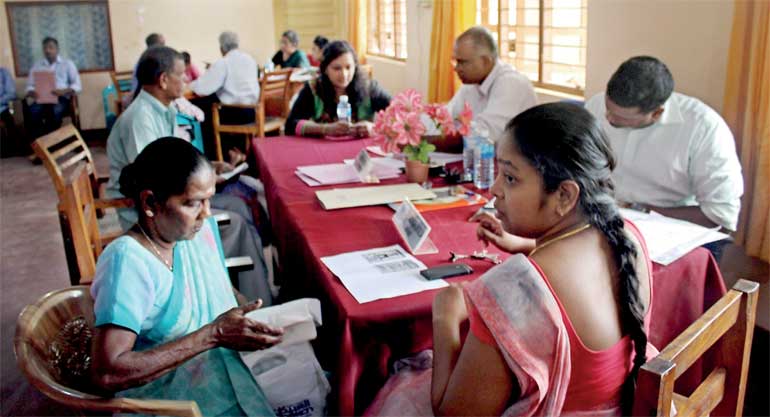Wednesday Feb 18, 2026
Wednesday Feb 18, 2026
Tuesday, 13 October 2015 00:01 - - {{hitsCtrl.values.hits}}
Impatience is a luxury victims of state violence can ill-afford. The state is often the victor; and victors hold the pen. They write the story. They define it for posterity.
In 2015, Miriam Gebhardt did the unthinkable. Her book, When the Soldiers Came, claimed that American soldiers raped thousands of women during the Allied occupation of Germany following the Second World War. The claim was largely based on records meticulously kept by Bavarian priests. What is extraordinary about the claim is not its contents but its timing. Gebhardt’s book was published seven decades after these atrocities allegedly took place.
Despite the overwhelming odds, some stories can eventually be told. In that belief, victims celebrating the recent adoption of the UN Human Rights Council (UNHRC) resolution on Sri Lanka must prepare for a long and perilous journey. Their struggle is not against some lone perpetrator. It is against a State that has monopolised the telling of their story; a recurrent version defined by compassion for a privileged few and brutal finality for the unfortunate rest.

When the inquiry is without prejudice, we learn that the enormity of human loss can never be reduced to a single narrative. Pictured, the Presidential Commission to Investigate into Complaints Regarding Missing Persons holding sittings in Batticaloa last August
The forgiveness trap
After the war, the Sri Lankan State constructed a narrative that trapped victims within its walls. ‘We defeated terrorism; we must be grateful to our war heroes; we must forget the bloodshed and move on.’ What held this narrative together was the idea that the ‘Sri Lankan’ version of transitional justice was based on ‘maithri' and 'karunā’—i.e. compassion.
It was the previous administration that first championed the idea. In 2011, former Attorney-General Mohan Peiris proposed that Sri Lanka’s religious teachings and cultural values produced a uniquely ‘Sri Lankan’ version of justice based on tolerance and compassion.1 Sri Lankan victims were presented as subscribing to this model.
A year earlier, former Foreign Affairs Minister, G.L. Peiris argued that the ‘Sri Lankan approach’ did not focus on punishment, but rather on what he defined as ‘restorative justice’.2 In late 2013, former High Commissioner to the United Kingdom, Chris Nonis, reiterated these sentiments in a celebrated interview with CNN.3
The purpose of this narrative is simple. By reducing victims to creatures of compassion, it seeks to minimise the accountability of the State. The political inconvenience of investigating military crimes ultimately shapes the contours of the narrative. It is therefore designed to dispel calls for accountability by casting them as Western impositions of retribution on a society predisposed towards compassion.
The Sri Lankan State then co-authored the UNHRC resolution on Sri Lanka in September 2015. By doing so, it signalled a motivation to shift away from a reductive narrative. It is now committed to enacting new laws criminalising war crimes and crimes against humanity, and ensuring their retroactive application. It is equally committed to recognising command responsibility and establishing a credible justice mechanism with the participation of foreign judges, prosecutors, lawyers and investigators.
Yet the new Government’s rhetoric of late has been strangely reminiscent of its predecessor’s. The Prime Minister recently announced the establishment of a ‘Compassionate Council’ as an adjunct to the proposed Commission for Truth, Justice, Reconciliation, and Non-Recurrence.4 Champika Ranawaka earlier claimed that investigating the past would ‘rub salt on old wounds’.5 Such terminology betrays a continuing agenda to reduce Sri Lanka’s search for truth and justice to a narrative of forgiving and forgetting.
The hangman in the mirror
There is an irony to the claim that Sri Lanka’s approach to justice has religious and cultural undertones of compassion. There is certainly no hint of compassion in our legal system. Our prisons are grotesquely overcrowded. According to a recent study by the University of Colombo, the current crisis in prisons may be due to judicial and executive inclinations towards punitive justice.6
Last month, the public reaction to the egregious violence inflicted upon a child bore all the hallmarks of righteous indignation. Social media was rife with calls for the swift reintroduction of the death penalty. Few paused to question the basis on which a 17-year old suspect was arrested. We later learn that he was tortured in custody. The mad scramble to arrest someone—anyone—and the populist political overtures on the need for the death penalty reflected one thing alone: a visceral public demand for retribution.
There is a serious contradiction between Sri Lanka’s so-called compassionate approach to transitional justice, and its ostensible approach to crimes in ordinary life. This contradiction extends to the public’s support for a war deemed necessary regardless of the human cost. Why are victims of State violence expected to forgive and forget while the rest of society bays for blood? The answer perhaps lies in the realm of political expedience.
The State’s aim to prejudge a narrative is ultimately animated by majority will. When the majority objects to punishment, the State promotes compassion. When the majority calls for retribution, it inflicts violence with reckless abandon. For victims, these broad and careless brushstrokes only serve to whitewash their stories.
Let them write their story
Imagine a family around a dinner table grieving the premature loss of a loved one. Imagine that a drunken driver was at fault. Would we expect this family to cope in the identical manner? Would they uniformly seek to forgive the offender? Would they unanimously demand his punishment? Some disagreement around that table would hardly surprise us. If we can conceive of a single family  producing such diverse views, should we then reduce Sri Lankan victims to a single narrative?
producing such diverse views, should we then reduce Sri Lankan victims to a single narrative?
A quilt. A mosaic. This is what Sri Lankan truth and justice must look like. The most unlikely of stories begin to emerge when victims are given the pen. Take for instance, these words: “I want to find out what happened to my husband…the person who gave the order to abduct my husband must know more about what happened to him than the persons who abducted him. So I truly want to know who gave the order.”7
These are not the words of a Tamil widow whose husband disappeared during the war. They are of a Sinhalese Buddhist woman from a remote town in Kandy. The military abducted her husband more than 28 years ago during the Southern insurrection.
When the inquiry is without prejudice, we learn that the enormity of human loss can never be reduced to a single narrative. In grief, there are no Sinhalese, Buddhists, Tamils, Hindus, Christians or Muslims. There are only human beings. Some want truth. Some want justice. Some may wish to move on. But the choice is theirs alone. It is not a matter for the majority to decide; it is not a story for the State to write.
The UN resolution has presented this country with a rare moment. As we prepare to reckon with our past, we must let victims lead the quest for a common narrative. We must recognise the trauma and complicity we bear together as one society. It is only by confronting truth and submitting to justice that we can attain our collective atonement.
Should we fail to seize this moment, bear in mind that truth and justice will inevitably triumph—if not here in Sri Lanka, then perhaps one day in The Hague. Rest assured, as long as victims survive to be witnesses—as long as some records are meticulously kept—their stories will be told.
Footnotes
Mohan Peiris, ‘Sri Lanka’s Approach: Restorative Justice vs. Retributive Justice’, 24 November 2011, at http://www.kadirgamarinstitute.lk/events/video.htm.
2 Speech by Prof. G.L. Peiris at the 9th IISS Asia Security Summit, The Shangri-La Dialogue, Singapore on 6 June 2010, at http://www.mea.gov.lk/index.php/en/media/ministers-speeches?start=15.
3 ‘CNN interview with H.E. Dr. Chris Nonis, Sri Lankan High Commissioner to the United Kingdom’, November 2013, at https://www.youtube.com/watch?v=qUwQBm2hMM4.
4 ‘What Ranil didn’t say’, Ceylon Today, 29 September 2015, at http://www.ceylontoday.lk/52-105139-news-detail-what-ranil-didnt-say.html.
5 Patali Champika Ranawaka, ‘From Puthumathalan to Geneva...’, Daily Mirror, 24 September 2015, at http://www.dailymirror.lk/88597/from-puthumathalan-to-geneva.
6 Centre for the Study of Human Rights (University of Colombo), A Study on Streamlining Rehabilitation Programmes in Prisons (2013).
7 Gehan Gunatilleke, Confronting the Complexity of Loss: Perspectives on Truth, Memory and Justice in Sri Lanka, Law & Society Trust (2015), at 52.
[Gehan Gunatilleke is a lawyer and researcher based in Colombo. He is the author of ‘Confronting the Complexity of Loss: Perspectives on Truth, Memory and Justice in Sri Lanka’ (Law & Society Trust: 2015).]